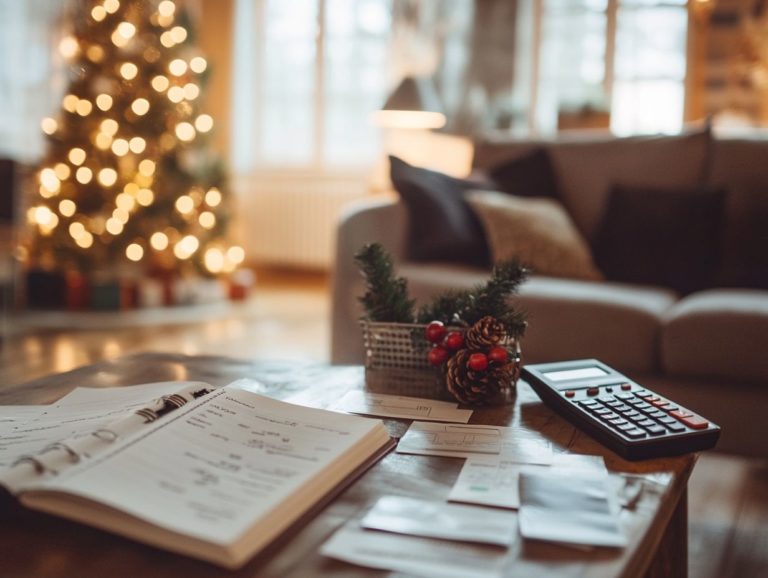A Guide to Budgeting for Homeowners
Navigating the world of finances can feel overwhelming, particularly for homeowners balancing a multitude of expenses and obligations. Get ready to streamline your financial management with this guide!
This guide offers practical insights into evaluating your income and expenses. You’ll discover how to craft a personalized budget plan, set realistic financial goals, and discern what s essential versus non-essential in your spending habits.
Uncover effective strategies to reduce costs on utilities and household expenses. Manage your debt and prepare for long-term financial commitments. With these tools at your disposal, you’ll be empowered to take command of your financial future.
Contents
- Key Takeaways:
- Understanding Your Finances
- Creating a Budget Plan
- Cost-Cutting Strategies
- Managing Debt
- Planning for Long-Term Expenses
- Frequently Asked Questions
- What is a budget and why is it important for homeowners?
- How can I effectively manage my budget as a homeowner?
- What are some tips for sticking to a budget as a homeowner?
- Should I include savings in my budget as a homeowner?
- What should I do if I have trouble sticking to my budget?
- Is it possible to still have fun while sticking to a budget as a homeowner?
Key Takeaways:

- Assess your income and expenses to gain a clear understanding of your finances.
- Create a budget plan that includes financial goals and distinguishes between essential and non-essential expenses.
- Utilize cost-cutting strategies, such as saving on utilities and reducing household expenses, to manage your budget effectively.
Understanding Your Finances
Understanding your finances is the cornerstone of successful homebuying. It provides a solid foundation for achieving your financial goals.
By checking your credit score, monthly expenses, and overall financial situation, you can strategically prepare to navigate the complexities of homeownership.
Being financially prepared goes beyond just having a budget. You need a thorough understanding of home loan interest rates, potential closing costs (fees paid when finalizing a property purchase), and how property taxes will influence your long-term financial landscape. This includes factors such as home warranty and appraisal fees.
Establish a strong savings account to cover unexpected costs. This ensures you re ready to handle any challenges that may arise during the homebuying journey, including potential home repair needs.
Assessing Income and Expenses
Assessing your income and expenses is essential for gaining a clear understanding of your financial health, particularly on the path to homeownership.
By meticulously analyzing your housing costs, maintenance expenses, and other living expenditures, you can craft a comprehensive budget that aligns with your financial circumstances and aspirations.
You must also consider recurring expenses like homeowners insurance and association fees. Unexpected repair bills can emerge at any moment, making it vital to maintain a financial buffer for emergencies.
Utilizing structured budgeting techniques, such as the 50/30/20 rule, allows you to optimize your financial strategy. This ensures a well-balanced allocation toward necessities, discretionary spending, and savings. Regularly revisiting and adjusting your financial plan guarantees that it remains relevant and effective as your circumstances change.
Creating a Budget Plan
Crafting a budget plan is an essential milestone for anyone aspiring to become a homeowner, especially if you’re a first-time homebuyer navigating the journey for the first time.
A thoughtfully structured housing budget goes beyond merely tallying the down payment and closing costs. It seamlessly incorporates ongoing expenses such as mortgage payments, property taxes, and homeowners insurance, ensuring that all facets of the home buying process are covered.
This comprehensive approach not only safeguards your financial stability but also aligns with your broader financial aspirations. This includes ensuring adequate emergency funds for unexpected situations.
Setting Financial Goals
Setting financial goals is crucial on your journey to homeownership. It serves as a compass for your financial decisions.
By pinpointing specific objectives like building an emergency fund, boosting your savings, and planning for potential home improvements you can create a strategic plan that aligns with your long-term aspirations.
Think beyond just the immediate purchase. Prioritize savings for a down payment; aiming for at least 20% can save you from extra costs, like private mortgage insurance.
Create an emergency fund to cover three to six months of living expenses. This provides invaluable peace of mind during unpredictable times. Tackle high-interest debts to free up resources for savings.
Track your progress with budgeting apps or spreadsheets. Set milestones that hold you accountable and inspire you to keep pushing toward your financial goals.
Identifying Essential and Non-Essential Expenses

Identifying essential and non-essential expenses is vital for crafting a sustainable budget. A budget review helps distinguish between necessary costs, like monthly mortgage payments, and discretionary spending.
Prioritize needs such as groceries, insurance, and healthcare over wants like entertainment subscriptions or dining out. For example, meal prepping can reduce food expenses significantly.
Choose budget-friendly entertainment options, like attending free community events. Regularly revisit your expense classification to adapt to life s changes.
Cost-Cutting Strategies
Implementing effective cost-cutting strategies can ease the financial strain of homeownership. This keeps you comfortably within your housing budget.
Identify areas to trim household expenses, such as utility bills and home repairs. This proactive approach improves your situation and prepares you for unexpected costs.
Ways to Save Money on Utilities
Saving money on utilities is crucial for your budgeting strategy. These recurring costs can impact your overall expenses.
Implement energy efficiency measures to achieve substantial savings. Investing in ENERGY STAR-rated appliances significantly cuts electricity usage without compromising performance.
Incorporate smart home technology to manage your energy consumption better. This enhances your homeownership experience.
Adopt small changes like unplugging devices when not in use. These habits lead to meaningful savings.
Channeling these savings into your overall budget boosts your financial security and promotes a more sustainable lifestyle.
Reducing Household Expenses
Reducing household expenses is essential for reaching your financial goals and nurturing a healthy savings account, especially if you’re a first-time homeowner.
By adopting effective budgeting techniques and scrutinizing areas of non-essential expenses, you can uncover substantial savings that enhance your overall financial landscape.
Exploring diverse strategies can help you streamline your spending. For example, meal planning not only cuts costs but also reduces food waste by ensuring you purchase only what you truly need.
Taking a closer look at your unused subscription services and potentially eliminating them can free up extra cash each month. Another smart approach involves negotiating your insurance coverage to secure better rates without sacrificing essential protections.
By implementing these practical budgeting methods, you can work toward establishing a more stable financial foundation while still savoring life s little joys, which is critical for new homeowners.
Managing Debt
Effectively managing debt is essential for you as a prospective homeowner, as it significantly influences your credit score and overall financial health.
Strong debt reduction strategies can boost your purchasing power and reduce potential mortgage insurance costs when you apply for a home loan, ensuring a better rate on your mortgage.
Taking control of your debt will enable you on your journey to homeownership, especially when leveraging down payment assistance options.
Strategies for Paying Off Debt

Developing effective strategies for paying off debt is crucial for aligning your financial goals with your aspirations for homeownership.
By employing credit management techniques like the avalanche method and snowball method you can systematically reduce your debt burden and enhance your financial situation, making you a more appealing candidate to lenders when it comes to securing favorable mortgage rates.
Understanding which method suits your personal circumstances is essential. The avalanche method prioritizes high-interest debts, allowing you to save more money on interest over time. Conversely, the snowball method focuses on tackling smaller debts first to build momentum.
Setting realistic repayment timelines and tracking your progress can significantly boost your accountability.
A clear repayment plan not only alleviates stress but also helps you identify areas where you can trim unnecessary expenses, ultimately guiding you closer to financial freedom and your dream of homeownership.
Consolidation and Refinancing Options
Consolidation and refinancing options offer you valuable pathways for effective debt management, potentially lowering your interest rates and simplifying your monthly payments.
By exploring these avenues, you can relieve financial pressure while enhancing your credit score and setting the stage for future homeownership.
These strategies streamline your financial obligations and carve a clearer path to stability, allowing you to allocate more funds toward savings and investments.
As you lower your monthly payments, the stress of juggling multiple debts diminishes significantly, giving you a renewed sense of control over your finances.
With more manageable payments, you may find it easier to achieve other financial goals, ultimately leading to an improved credit profile. This improvement could transform your dreams of homeownership into reality!
Planning for Long-Term Expenses
Planning for long-term expenses is crucial for maintaining your financial stability and ensuring that your home remains a safe and comfortable sanctuary.
By setting up a dedicated savings account specifically for home maintenance and repairs, along with budgeting for those unexpected costs that seem to pop up out of nowhere, you can craft a sustainable financial plan that effectively meets your future needs.
Saving for Home Maintenance and Upgrades
Saving for home maintenance and upgrades is a vital aspect of responsible homeownership that can spare you from costly repairs down the line. By contributing to a dedicated savings account for these expenses, you can align your financial goals with the ongoing needs of your property.
Regularly setting aside funds acts as a safety net against unexpected costs. This strategy ensures your home remains in peak condition. Crafting a budget that designates a specific percentage of your income or home value for maintenance gives you a clear path forward, especially when you know how to create a budget for a home renovation.
Create a detailed inventory of upcoming projects, estimate their costs, and prioritize them based on urgency. These proactive steps enhance your long-term financial health and reduce the likelihood of major replacements, boosting the overall value of your home.
A well-maintained property requires fewer unexpected repairs. This allows you to build equity more efficiently over time.
Frequently Asked Questions
What is a budget and why is it important for homeowners?

A budget is a financial plan that outlines your income and expenses. Homeowners can track their spending with a budget, ensuring they do not overspend. It also helps save for future expenses or emergencies.
How can I effectively manage my budget as a homeowner?
To create a budget, first list all your sources of income and then all your expenses. Include fixed expenses, which are costs that don t change each month, like your mortgage and utilities. Also, consider variable expenses like groceries and entertainment. Compare your income and expenses to see if adjustments are needed.
What are some tips for sticking to a budget as a homeowner?
- Track your spending regularly to identify areas where you may overspend.
- Set realistic goals for your budget and commit to them.
- Have an emergency fund for unexpected expenses.
Should I include savings in my budget as a homeowner?
Yes, include savings in your budget for future home improvements, unexpected repairs, or even for a down payment on a new home. It s recommended to save at least 10-15% of your income each month.
What should I do if I have trouble sticking to my budget?
If you struggle with your budget, identify where you overspend and find ways to cut back. Consider using cash instead of credit cards for easier tracking. Seeking advice from a financial planner or counselor can also be helpful.
Is it possible to still have fun while sticking to a budget as a homeowner?
Absolutely! Look for free or low-cost activities in your community. Host potluck dinners with friends instead of dining out. Find creative ways to enjoy your hobbies while saving money.
Don t wait until a small issue becomes a big problem! Start saving now to keep your home in top shape.






